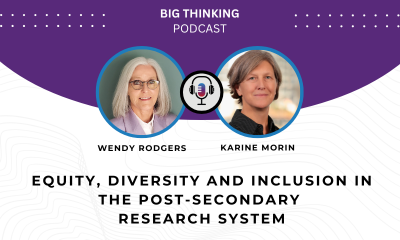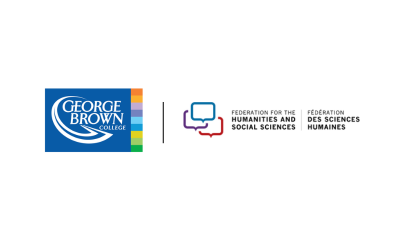The Federation believes a just and vibrant society is rooted in inclusive knowledge, critical reflection, and meaningful collaboration. Through our initiatives and partnerships, we work to support spaces where diverse voices are heard and transformative ideas can take root.
This work is ongoing. We continue to reflect, adapt, and engage, and are continually enriched by the perspectives of the communities we aim to support.
Join us in advancing collective understanding and structural change. Check back for updates and new initiatives.
Get involved | EDID Action Plan | EDID Progress update | Past initiatives | You might also like
Get involved
- Explore the Igniting Change: Final Report and Recommendations
- Read the Federation's Charter on Equity, Diversity, Inclusion, and Decolonization in the Social Sciences and Humanities
- Learn more about the EDID Initiatives Fund
- The EDID Initiatives Fund is intended to support scholarly associations' initiatives that advance Equity, Diversity, Inclusion, and Decolonization
- Contact us at policy@federationhss.ca.
The Federation releases its plan outlining current equity, diversity, inclusion, and decolonization commitments and actions for 2024. Read the plan.
On April 8, 2021, the Federation announced concrete steps to turn the Committee’s words into action, to be accountable to its community for the results, and to sustain progress over time via its five-point Action Plan.
The Federation released its 2024 Progress Update. The report provides a concise summary of the Federation's progress in advancing its 2024 Action Plan commitments to equity, diversity, inclusion, and decolonization. Explore the report.
On April 25, 2023, the Federation released its third update on the recent steps taken in support of the Federation's commitment to equity, diversity, inclusion, and decolonization. Read the Progress Update.
On October 31, 2022, the Federation released its second update on the progress that has been made so far in the areas of equity, diversity, inclusion, and decolonization. Read the Progress Update.
In April 28, 2022, one year after the release of the “Igniting Change” report, the Federation shares the progress that has been made so far in the areas of equity, diversity, inclusion, and decolonization. Read the Progress Update.
The Federation launches new EDID Initiatives Fund
In February 2023, the Federation is piloting the EDID Initiatives Fund, a new funding opportunity that will support member associations in developing initiatives that advance equity, diversity, inclusion, and decolonization (EDID). Learn more.
The Federation hosts accessibility breakout room discussion at Member Forum
On March 15, 2022, leaders of 26 member associations were joined virtually by Fizza Haider and Kim Ashbourne of the University of Victoria for a discussion on improving accessibility in association activities and at Congress.
The Federation holds its first virtual Member Forum for associations on EDID
On November 23, 2021, leaders of 33 member associations gathered virtually to discuss issues facing the HSS community; actions being taken to support equity, diversity, inclusion, and decolonization both at the Federation and in associations; and questions about upcoming Congresses.
The Federation establishes a new standing Committee on EDID and creates a new staff position of Senior Advisor, EDID
On October 27, 2021, the Federation releases an update on its EDID work and commitment.
The Federation endorses the Charter on EDID in the Social Sciences and Humanities
On April 8, 2021, we endorsed the Charter on Equity, Diversity, Inclusion, and Decolonization (EDID) in the Social Science and Humanities.
Our goal in supporting the Charter is to address obstacles that negatively affect the career trajectories and lived experiences of individuals from diverse communities, including women; First Nations, Inuit, and Métis peoples; members of racialized communities; persons with disabilities; members of LGBTQ2S+ communities; and linguistic, religious, and cultural communities.
We encourage our member associations, institutions, affiliates, as well as individuals to read, discuss, support, and promote the Charter.
The Federation adopts a new Code of Conduct
The Federation requires that all members, affiliate members, participants, and those accompanying participants to Federation activities, whether in-person or virtual, comply with the Code of Conduct as set out herein and as may be amended by the Federation from time to time. Failure to do so may result in disciplinary action up to and including expulsion from Federation membership and/or participation in Federation activities. Read our Code of Conduct and Complaints Investigation Procedure.
The Federation adopts the Touchstones of Hope Principles and Processes
In 2015, the Federation adopted the Touchstones of Hope Principles and Processes to guide its work on reconciliation. In this framework, reconciliation is recognized as being a movement that must be built and sustained — it is not an event or a short-term project.
The five core Touchstone of Hope Principles include:
- Recognizing Indigenous peoples’ right to self-determination;
- The need to take a holistic approach to promoting reconciliation;
- Respecting Indigenous cultures and languages and acknowledging the academy is heavily influenced by Western cultures;
- The need for structural interventions to address systemic disadvantage and historical wrongs; and
- Non-discrimination: ensuring that the right of Indigenous peoples to be free of discrimination is respected throughout the academy.
These Principles are situated in a four-phase reconciliation process: truth telling, acknowledging, restoring and relating.
Read the Federation’s media release announcing our commitment
The Federation introduces the Virtual Congress Child and Dependent Care Subsidy for Congress 2022
The program is part of the Federation’s commitment to creating a more accessible, equitable, inclusive, and decolonized Congress experience for all attendees. This program provides financial support up to $200 to enable Congress presenters with dependent care responsibilities to participate in virtual Congress activities.
Update on Congress registration categories
In January 2022, the Federation waives Congress fees for students who identify as Black or Indigenous; community passes are complimentary for community members who identify as Black or Indigenous.
The Congress Advisory Committee on EDID releases “Igniting Change”
The Charter was developed by the independent Congress Advisory Committee on EDID, and is a key component of “Igniting Change”, the Committee’s final report and recommendations. Both a call to action and a valuable resource, “Igniting Change” is helping us to identify and address barriers to equitable, diverse, and inclusive participation in our events, particularly the Congress of the Humanities and Social Sciences, Canada’s largest academic conference.
Guided by the Committee’s work, we have expanded our historic support for EDI to encompass decolonization — the "second D” in EDID — and we are supporting critical conversations about colonialism, anti-Black racism, and other pressing social and racial justice issues.
The Federation makes a number of commitments with regards to Congress
On February 11, 2021, we announced Congress 2021 fees will be waived for students who self-identify as Black or Indigenous. In addition, community passes are complimentary for members of the general public who self identify as Black or Indigenous.
We committed to a future face-to-face Congress theme centred on Black and Indigenous experience and scholarship in Canada, building on the advocacy of the BCSA and in consultation with Black scholars, First Nations, Inuit and Métis scholars and communities, and with scholarly associations.
The Federation establishes agreement with the Black Canadian Studies Association (BCSA) for Congress 2022
In December 2021, the BCSA announced its participation in Congress 2022. The Federation re-affirmed its commitments to the BCSA, including “the waiving of fees, a future in-person Congress theme focusing on Black Studies/anti-Black racism, eventual grant support, and technical assistance for virtual Congress.”
The Federation appoints a Congress Advisory Committee on EDID
“As Canada’s largest academic gathering, Congress annually empowers more than 8,000 scholars to have critical discussions, build and strengthen networks, and showcase the incredibly valuable work happening within the Humanities and Social Sciences. We have a duty to make the opportunities and benefits of Congress as accessible as possible to all members of our community.” Read the announcement.
The Federation commits to change following incident of racial profiling and anti-Black racism at Congress
On June 2, 2019, a disgraceful act of racial profiling and anti-Black racism occurred at Congress 2019.
The Black Canadian Studies Association (BCSA), along with several other member associations, alerted the Federation to issues of bias, discrimination, and systemic racism. These associations played—and continue to play—a fundamental role in sparking change at the Federation, in Congress and in higher education as a whole.
Following the incident at Congress 2019, the Federation completed a full, independent investigation and took decisive action based on the findings, including moving swiftly to fully address the four requests put forward by the BCSA.
Equity Matters blog series
Equity Matters was a blog series that ran for a decade, featuring hundreds of contributions from scholars who engaged in thoughtful dialogue on the complex challenges faced by equity-deserving groups. This series served as a valuable platform for fostering teaching, scholarly debate, and discussions on equity and diversity issues in Canada.
While the series is no longer active, you can still access all past Equity Matters contributions by visiting the Resource Hub.
You might also like

Equity, Diversity and Inclusion in the Post-Secondary Research System
← Big Thinking Podcast homepage Next episode → Description | About the guest | About the report | Transcript | Follow us Description Earlier this year, the Council of Canadian Academies released its report “Equity, Diversity and Inclusion in the...

Bringing communities together
By Dr. Margrit Talpalaru, professor & Academic Convenor for Congress 2025 at George Brown College George Brown College (GBC) is the first college to host the Congress of the Humanities and Social Sciences in its 94 years: this has emerged as the...

Prestigious Canada Prizes return as Federation’s flagship celebration of scholarly books
We are delighted to announce that the Canada Prizes, the Federation’s national book funding awards, return this month with a new vision to celebrate five winning books and their authors. Going forward, the annual Canada Prizes will recognize the...
